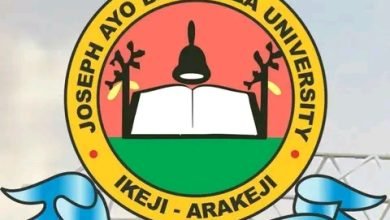Caleb University, school fees, admission requirements
Caleb University is a private university located in Imota, Lagos State, Nigeria. The university was founded in 2007 by Prince Oladega Adebogun, who is also the Chancellor of the institution.
Caleb University is named after Caleb, a biblical character known for his faithfulness, courage, and steadfastness.
In this article, we will be looking at the fees, admission requirements, and hostel process of Caleb University.
Caleb University courses offered
• Accounting
• Architecture
• Banking and Finance
• Biochemistry
• Building
• Business Administration
• Chemistry
• Computer Science
• Criminology
• Economics
• Education and Christian Religious Studies
• English and Literary Studies
• Environmental Management And Toxicology
• Estate Management
• Guidance and Counseling
• History and Diplomatic Studies
• Industrial Chemistry
• Information Systems
• International Relations
• Law
• Mass Communication
• Mathematics
• Microbiology
• Microbiology and Industrial Biotechnology
• Peace Studies And Conflict Resolution
• Philosophy
• Physics
• Physics With Computational Modeling
• Plant Science and Biotechnology
• Political Science
• Psychology
• Public Administration
• Quantity Surveying
• Statistics
• Taxation
• Zoology and Aquaculture
• Christian Religious Studies (CRS)
• Cyber Security
Fees of Caleb University
The fees of Caleb University vary depending on the course of study and the level of the programme.
It is important to note that the fees are subject to change, and it is advisable for prospective students to confirm the current fees from the university’s official website or from the admissions office.
However, we will provide an estimated fee schedule for the 2021/2022 academic session:
– Faculty of Agriculture (all programmes) – N467,000
– Faculty of Arts, Social and Management Sciences (all programmes) – N505,000
– Faculty of Environmental Sciences (all programmes) -N559,000
– Faculty of Law (all programmes) -N717,000
– Faculty of Science (all programmes) – N560,000
Additionally, there are ancillary fees such as ICT fees, Sports fees, ID Card fees, Library fees, Health fees, and Entrepreneurship fees that students are expected to pay.
The ancillary fees vary depending on the programme and the level of the programme.
Admission Requirements of Caleb University
The admission requirements of Caleb University are slightly different for the various levels of programmes that the university offers.
However, we will look at the general requirements for undergraduate and postgraduate programmes in the university.
Undergraduate Admission Requirements:
– Candidates must have at least five (5) credits in relevant subjects in not more than two sittings in either the West African School Certificate Examination (WASSCE), the National Examination Council (NECO) or the General Certificate of Education (GCE) examination.
– Candidate must score a minimum of 180 in the Unified Tertiary Matriculation Examination (UTME)
– Candidates must write the Post UTME screening examination of Caleb University.
Postgraduate Admission Requirements:
– Candidates must have a degree from a recognized institution with a minimum of second class lower division.
– Candidates must have completed the National Youth Service Corps (NYSC) or have obtained an exemption letter.
– Candidates must have a good score in Allied Admission Test (AAT) or Graduate Record Examination (GRE).
Hostel Process of Caleb University
Caleb University has a well-equipped hostel facility that can accommodate a significant number of students.
The hostel has different categories of rooms ranging from single rooms to four-bedded rooms.
The fee for the hostel accommodation varies depending on the type of room and the level of the programme.
Students who are interested in staying at the university hostel are expected to indicate their interest during the admission process.
The allocation of rooms is based on a first-come, first-serve basis. However, priority is given to students who are on scholarship, and those from distant locations.
Prospective students should note that hostel accommodation is not a guarantee, and as such, alternative accommodation arrangements should be made in case they are not allocated a room in the hostel.








